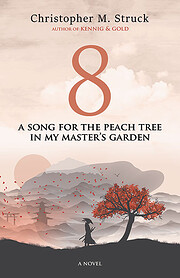

Fai clic su di un'immagine per andare a Google Ricerca Libri.
|
Sto caricando le informazioni... 8 : A Song for the Peach Tree in My Master's Gardendi Christopher M. Struck
Nessuno Sto caricando le informazioni...
Iscriviti per consentire a LibraryThing di scoprire se ti piacerà questo libro. Attualmente non vi sono conversazioni su questo libro.  Questa recensione è stata scritta per Recensori in anteprima di LibraryThing. Questa recensione è stata scritta per Recensori in anteprima di LibraryThing.I selected this book on the basis of the advertised synopsis, which made the plot seem like an epic action saga with a romance story line woven in. What I found as I read was nothing of the sort. The novel is actually an introspective, fictionalized account of the life of legendary samurai Miyamoto Musashi, although this isn't made clear until the second half of the book. Once the historical figure who inspired the story was revealed, I was able to learn more about him from other sources, which helped the book as a whole make more sense. Musashi's tale begins when he was a boy named Hachi and chronicles his transformation into the famed samurai. The peach tree of the title serves as a symbol of the protagonist's connection to his former life: once his transformation is complete, the physical tree disappears from the narrative entirely, remaining only in a painting displayed on a woman's wall. Musashi narrates in the first-person; however, some third-person passages are featured, which raise questions as to how reliable the protagonist is as a narrator. Though the novel records Musashi's inner thoughts and mental state in detail in every chapter, it often gazes at its own navel for extended passages. Dialogue markers are often ambiguous and hard to follow. Readers would be wise to approach this book as they might with works of Japanese art and haiku - in other words, by examining the details on their own merits and reflecting on the overall impressions that they give.  Questa recensione è stata scritta per Recensori in anteprima di LibraryThing. Questa recensione è stata scritta per Recensori in anteprima di LibraryThing.Hachi is a slave training to become a samurai. He sees taking up the sword as his only chance to better his life and social standing, and he envisions the freedom it could provide. The story is revealed through Hachi’s point of view. In addition to his daily training activities, Hachi introduces us to two creatures of his imagination. He focuses considerable attention on a peach tree within his master’s estate. The reader goes along to a few encounters with the tree but uses the tree as a symbol of his ambition and goals. He also dwells on a chance encounter with his master’s daughter Umi whom he believes to be his one true but unattainable love. Seeing the story through Hachi’s eyes has both its strengths and shortcomings. Being inside Hachi’s mind offers the reader into both Hachi’s experiences and his idealized views through images such as the titular peach tree and Umi. But such a view also limits the reader’s views and characterizations to Hachi’s often superficial evaluations. The reader gets an in-depth look into Hachi’s world as he sees it, but is only one side of the story. Hachi’s viewpoint is claustrophobic at times because of all of the repetition. It makes sense that Hachi would dwell on certain thoughts and circumstances while banishing others that the reader may want to understand more. The lyrical prose draws the reader into the world, but excessive repetition can leave the reader stuck in less essential parts of the story. I was drawn to this book as a fan of Asian historical fiction, such as Memoirs of a Geisha and Snow Flower and the Secret Fan. I would have preferred more plot but appreciated the poetic prose. Thank you, NetGalley and BHC Press, for providing me an advanced copy of the book in exchange for my honest review.  Questa recensione è stata scritta per Recensori in anteprima di LibraryThing. Questa recensione è stata scritta per Recensori in anteprima di LibraryThing.nessuna recensione | aggiungi una recensione
8 follows the story of Miyamoto Musashi on his path to becoming the greatest samurai in Japanese history, first as a boy samurai nicknamed Hachi. Following the exact timeline surrounding the establishment of the shogunate and the life of the only samurai to survive at least forty duels undefeated, 8 is a tale of devotion and revenge. After Hachi earns the title of samurai through surviving the teachings of seven samurai, these same seven betray Hachi's master and Hachi thus fails to live and die honorably as a true samurai. However, to avenge the injustice and comfort his tortured soul, the adult Musashi, chases his betrayers across all of Japan. Along his journey, he battles with his sense of identity and desire for peace and tranquility represented by a Peach Tree he once visited in his fallen master's garden, the symbol of innocence in his youth. Non sono state trovate descrizioni di biblioteche |
Già recensito in anteprima su LibraryThingIl libro di Christopher M. Struck 8: A Song for the Peach Tree In My Master's Garden è stato disponibile in LibraryThing Early Reviewers. Discussioni correntiNessunoCopertine popolari
 Google Books — Sto caricando le informazioni... Google Books — Sto caricando le informazioni...VotoMedia: (3.33) (3.33)
Sei tu?Diventa un autore di LibraryThing. |
||||||||||||||||||||||||||||||||||||||||||||||||||||||||||||||||||||||||||||||||||||||||||||||||||||||||||||||||||||||||
I did find the dialogue a little hard to follow and long at times, along with the characters internal struggles; while important to the story, many stated too often?
As I said though, overall an enjoyable story and glad I read it. :)